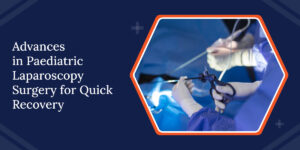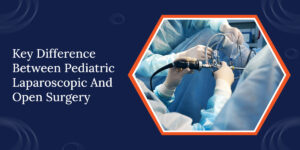
An imperforate anus in a newborn is a condition most parents have never heard of until it’s part of their newborn’s story. If you’ve just received this diagnosis, you may feel confused, anxious, or overwhelmed. That’s normal.
This guide will walk you through what the condition means, how it’s treated, and what life may look like afterward. Knowing what to expect won’t erase the worry, but it gives you the tools to face it with clarity and confidence.
A] What Is an Imperforate Anus?
An imperforate anus (IA) is a birth defect that affects the development of the anus and rectum. In a baby with this condition, the anal opening is either missing, incorrectly placed, or connected to another organ such as the urinary tract or vagina. These abnormal connections are called fistulas. You may find yourself asking, ‘What is imperforate anus in a newborn?’ and the short answer is: it’s a congenital defect requiring surgical correction.
Some cases are easier to treat than others. Doctors categorise IA based on how close the rectum is to the surface of the skin:
- Low-type imperforate anus
In this form, the rectum ends near the skin. It’s usually easier to repair, and surgery often happens quickly.
- High-type imperforate anus
Here, the rectum ends deeper inside the pelvis. The repair is more complex and often done in stages.
The exact type shapes the treatment plan. But no matter which type your baby has, there is a path forward, and many children grow up strong and healthy with the right care.
Know the Signs—Act Early for Your Newborn
B] Causes and Risk Factors
You may be wondering if something caused this. The truth is that most of the time, no one knows exactly why imperforate anus happens. It develops early in pregnancy when the lower digestive tract is forming. Something interrupts that process, but not because of anything you did or didn’t do.
In some cases, IA appears as part of a group of related conditions. One such group is called the VACTERL association, which refers to a pattern of birth defects involving several systems. One of the key signs is the absence of anus in a newborn, which can prompt doctors to check for other related anomalies like heart defects or spinal issues. These may include:
- The spine (vertebral anomalies)
- The anal opening
- The heart
- The trachea and esophagus (which may be connected abnormally)
- The kidneys
- The limbs, such as missing thumbs or forearm differences
If your child’s doctors suspect this group of conditions, they will order tests to check each area. Finding out early allows for better coordination of care.
C] Symptoms and How It’s Diagnosed
Most diagnoses happen soon after birth. The first sign is often a missing or blocked anal opening. Some babies also show:
- No bowel movement in the first 24 to 48 hours.
- Swollen belly from trapped stool.
- Stool passing through the urethra or vagina, if a fistula is present.
Once a doctor notices something unusual, the next steps move quickly. A physical exam comes first. Then imaging tests such as X-rays and ultrasounds help locate the rectum and identify the type of imperforate anus in the neonate involved.
Other tests often follow. These may include:
- An ultrasound of the kidneys
- A scan of the spine
- A heart echo (echocardiogram)
These checks make sure that any related issues are found and addressed early.
D] Treatment and Surgery
Once the diagnosis is confirmed, your child’s care team will create a treatment plan. This depends on how and where the rectum ends and whether other organs are involved.
Some babies need a colostomy soon after birth. This is a temporary opening in the belly that allows stool to leave the body through a bag. It protects the baby’s system until the main repair surgery can happen.
The primary repair is called posterior sagittal anorectoplasty (PSARP). In this surgery, the surgeon creates a new anal opening and connects the rectum to it.
- In low-type IA, this surgery can often be done in a single step without a colostomy.
- In high-type IA, the repair happens in stages. The colostomy comes first. Then the PSARP. Later, the colostomy is closed.
Recovery takes time, but outcomes are often strong. You’ll receive detailed instructions for wound care, feeding, and signs to watch for. Your care team will stay involved through every stage. For example, baby imperforate anus treatment may begin with a colostomy followed by staged surgical repair if the rectum is high.
E] Life After Surgery and Long-Term Management
Most children recover well. Still, it’s important to know that bowel function may take time to develop fully. Some children, especially those with high-type IA, experience challenges like:
- Constipation
- Trouble holding in stool
- Irregular bathroom patterns
This is common with imperforate anus in infants, and your child may need support for several years, including bowel management programmes and regular follow-ups.
You may be referred to a bowel management programme. These programmes are highly structured and often very effective. They may include:
- High-fiber foods
- Daily laxatives or stool softeners
- Scheduled toilet time after meals
- Enemas in some cases
With time, many children gain good bowel control. Some get there quickly. Others take years of support and adjustment. Every child’s path is different, but progress is possible—and common.
Doctors will also monitor your child’s growth, weight, and development. If other organs are affected, those specialists will stay involved too. In cases with urinary involvement, especially if fistulas affect the bladder or urethra, consulting a paediatric urologist in Dubai may also be necessary to ensure optimal urinary function and avoid complications.
F] Family Guidance and Support
You’re not just managing appointments and medications. You’re also feeding, comforting, bathing, and loving your child through this journey. That matters just as much as any surgery.
If your baby has a colostomy, it may take some practice to feel confident in caring for it. Nurses will show you how to clean the site, change the pouch, and protect the skin around it. The first few times may feel intimidating. That’s normal. You’ll get the hang of it quickly.
Having the right medical team can make a world of difference. If you’re in the UAE, a paediatric surgeon in Dubai with experience in anorectal malformations can help guide your baby’s care from diagnosis to post-op follow-up.
Try to keep feeding and playtime consistent. Routine helps babies feel secure, even when medical care is part of daily life. If you notice feeding trouble, ask for help. Nutrition is vital during healing.
Siblings may have questions or feel unsure. Keep explanations simple. Reassure them that their baby brother or sister is being well cared for and will be okay.
You may also need emotional support. Talking to other parents can help more than you might expect. Whether through online groups or in-person connections, it’s often comforting to hear from someone who has been where you are.
Know the Signs—Act Early for Your Newborn
G] Conclusion
An imperforate anus diagnosis is not something any parent is ready for—but with today’s treatment, most children go on to live healthy, full lives. They run, play, go to school, make friends, and do all the things kids are meant to do.
Surgery is only part of the story. Your support, your patience, your advocacy, and your daily care help your child thrive.
You don’t need to have every answer right now. You just need to take the next step, one at a time, with the right medical team by your side. And remember, you’re not alone. Many families have walked this path and come through stronger.
Your child’s story is just beginning. There’s every reason to hope, to plan, and to look forward. Don’t lose hope; contact Dr Bhushanrao Jadhav.

Dr. Bhushanrao Jadhav
Dr. Bhushanrao Jadhav is a highly skilled Pediatric Surgeon and Urologist specialising in minimally invasive and robotic surgeries for children. With advanced training from leading institutions in the UK, India and USA, he brings expertise in treating complex genitourinary conditions and neonatal surgical ailments. Driven by compassion and innovation, Dr. Jadhav has pioneered pediatric robotic surgery programs in Pune, India, ensuring world-class care tailored to children’s unique needs.




















